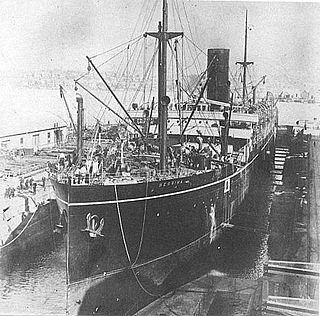Related Research Articles
Ten ships of the Royal Navy have been named HMS Lightning.
Nine ships of the Royal Navy have borne the name HMS Pioneer:

PS Waverley is the last seagoing passenger-carrying paddle steamer in the world. Built in 1946, she sailed from Craigendoran on the Firth of Clyde to Arrochar on Loch Long until 1973. Bought by the Paddle Steamer Preservation Society (PSPS), she has been restored to her 1947 appearance and now operates passenger excursions around the British coast.
Numerous British vessels have borne the name Prince of Wales, after the then current Prince of Wales, the title borne by the heir-presumptive to the throne of the United Kingdom.
Nine ships of the Royal Navy have been named HMS Rainbow, after the rainbow, a common meteorological phenomenon:
Eleven ships of the Royal Navy have borne the name HMS Firebrand.
Five vessels of the Royal Navy have borne the name HMS Prince Edward:
Five ships of the Royal Navy have borne the name HMS Tigris, after the river Tigris, in modern-day Iraq. Another was planned but never completed:
Numerous vessels have borne the name Talisman, including:
Britannia may refer to any one of a large number of ships:
Many vessels have been named Minerva for the mythological figure Minerva:

Caird & Company was a Scottish shipbuilding and engineering firm based in Greenock. The company was established in 1828 by John Caird when he received an order to re-engine Clyde paddle-tugs.
A number of ships have been named Asia, including:
This page describes the shipping services of the Glasgow and South Western Railway.
Neptune may refer to a number of ships named for Neptune, the god of freshwater and the sea in Roman mythology.
Several vessels have been named Ruby:
PS Waverley was a Clyde-built paddle steamer that carried passengers on the Clyde between 1899 and 1939. She was requisitioned by the Admiralty to serve as a minesweeper during World War I and again in World War II, and was sunk while participating in the Dunkirk evacuation in 1940. The current PS Waverley, launched in 1946, was built as a replacement for this vessel.
Several ships have borne the name Caledonia for Caledonia:
Several vessels have been named Laurel for the laurel.
References
- ↑ Ancestry.com Operations, Inc. (2008). "Bremen, Germany Ships Crew Lists, 1815-1917". Ancestry.com. Retrieved 27 Nov 2023[Reference regarding ship Juno found in image 1b. Original data: Staatsarchiv Bremen. 4,24, Seemannsamt Bremen:-E.4: Musterungen der Grönlandfahrer 1815-1872 (FS 5363).]
{{cite web}}: CS1 maint: postscript (link)